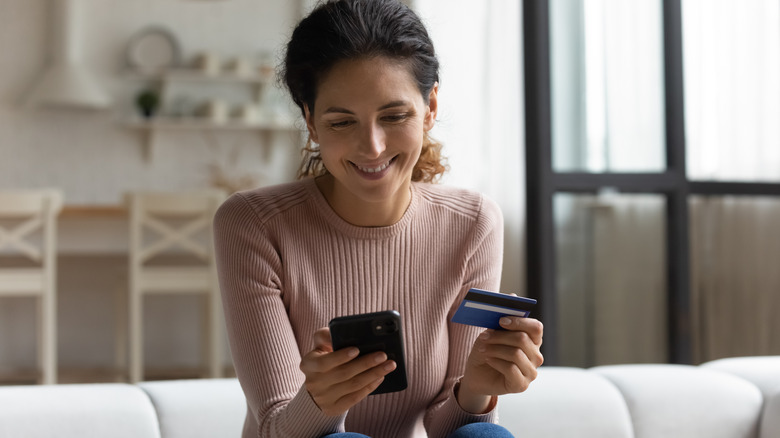Curb Your Shopping Addiction By Following These Tips To Limit Impulse Purchases
It happens in the blink of an eye. One minute you're looking at your phone, and the next, you're on an online marketplace ordering something you'll probably never use. Once the package arrives, you begin to wonder what could've possibly led you to order it in the first place. There are several reasons behind this seemingly spur-of-the-moment reaction. These days, the temptation to spend is only getting harder to resist.
As we scroll through social media, we see countless videos of influencers shilling products. Sometimes, it's just their aspirational lifestyles that make us want to copy them by buying things we don't need. And, when we go through our emails, we're bombarded with irresistible, limited-time discount offers. At the end of a tough day, sometimes some good old-fashioned retail therapy is just what we need to turn things around.
Unsurprisingly, our state of mind plays a big part in impulse buying. As psychologist Erika Martinez explained to Apartment Therapy, "When people purchase something they like or want, the reward centers of the brain get a hit of dopamine, which alleviates unsettling emotions." Martinez further warned, "Over time, the person will have to spend more to achieve the same emotional relief." While there's nothing wrong with treating yourself to something nice occasionally, it becomes a real problem when you turn into a shopaholic with piles of things you don't need and a whole lot of buyer's remorse.
Consider the psychology behind impulse buying
First, you need to figure out the reason for your shopping addiction. It's easy to believe that impulse buying stems solely from a lack of self-control, but there are most likely other emotional factors at play. Be mindful of the moments leading up to the impulse purchase. Before you pull the trigger, ask yourself how you're really feeling and whether there's a healthier alternative to get the same pick-me-up in another area of your life.
For extra restraint, envision yourself practically using the product instead of how it makes you feel in the moment. One of the main reasons why impulse buying is so hard to quit is that feeling of instant gratification. We see something we love, think about what it would be like to own it, and get it without any further thought. To curb this cycle, therapist Jessica Couch recommended an ingenious strategy to Apartment Therapy.
"Go ahead and add the items that are calling your name to your cart, but then wait at least six hours to finalize the purchase," she suggested, adding, "Often, we get distracted with other parts of life — like work, school, or friends — and we will be less likely to complete the purchase." This strategy can do more than distract. It will give you the chance to truly consider the utility of your purchase and how it fits into your budget (or doesn't). You could also consider a no-buy month to further curb your shopping addiction.
Financial planning is your best friend
One of the more obvious ways to stop buying everything you see is to have a budget and stick to it, but oftentimes, this can fuel our impulse purchase drive. When we set a budget that's too restrictive, we tend to feel the pull of our shopping addiction even more. To combat this, you should include a realistic amount you're willing to spend on non-essential, fun, miscellaneous items. It's so much easier to be tempted into buying things you don't need when you don't have a plan while shopping.
Further, regardless of whether you're browsing online or offline, have a list of items you're looking for. Try to stay focused on them instead of going through categories that trigger your impulse buying. If you're shopping in person, only carry the necessary amount of cash, so you have limited resources to overspend. Generally, using cash instead of swiping your card makes you acknowledge how much money you're really spending. To help cut down on unnecessary expenses, make it harder to use your card.
Clear your browser's auto-saved data so you have to fill in your details every time and set bank limits on purchases. Acknowledge and accept that you might mess up and buy things impulsively sometimes. Don't beat yourself up because that'll just create guilt and possibly lead to more impulse buying. Consider returning the item if possible. If not, forgive yourself and create a game plan to prevent the mistake from repeating itself.


